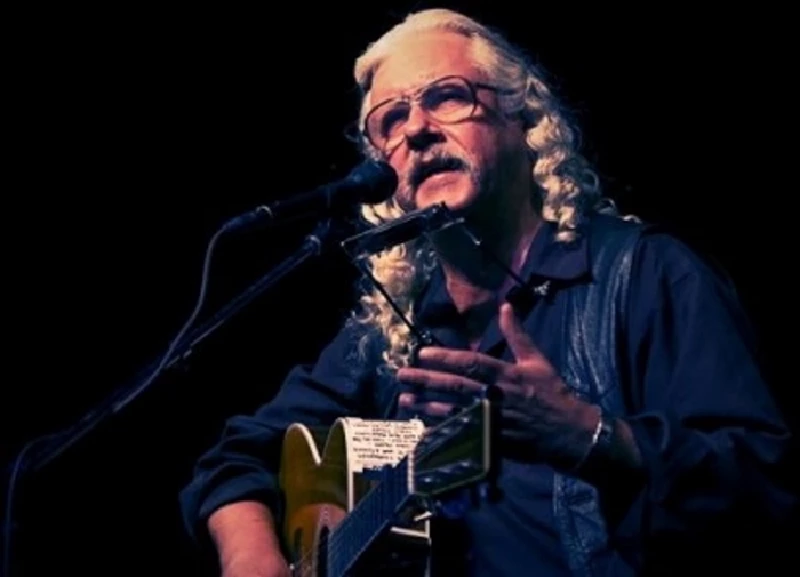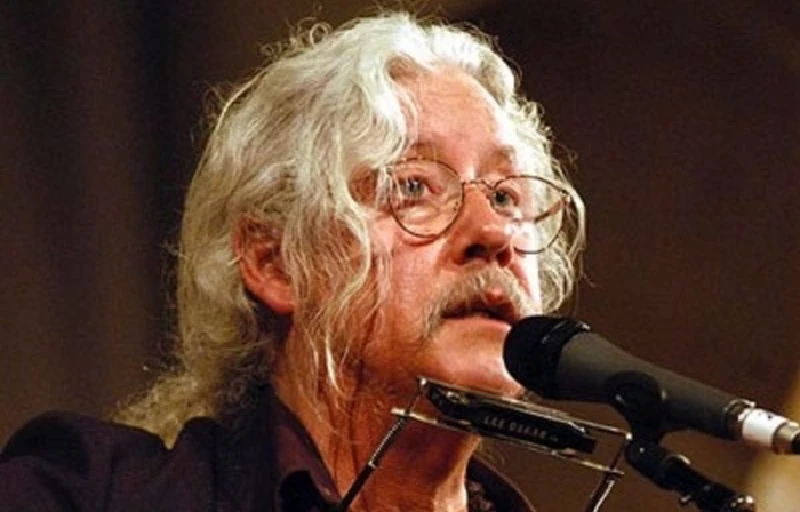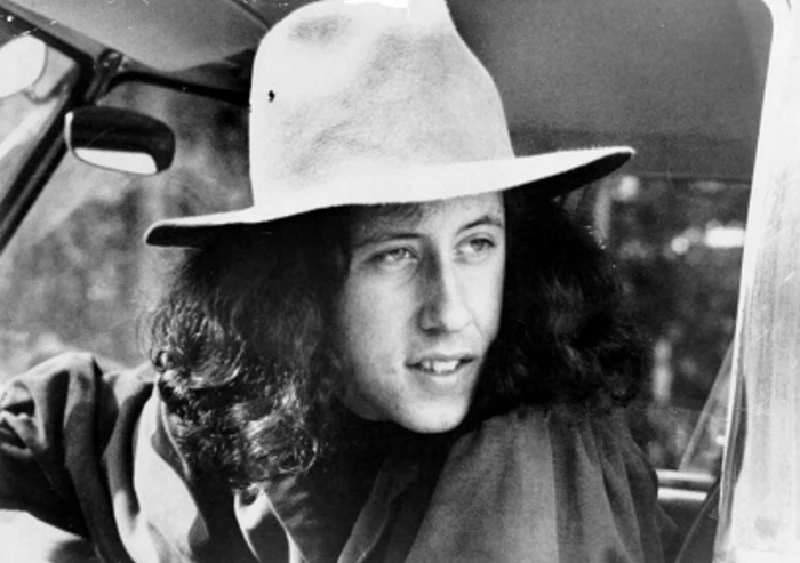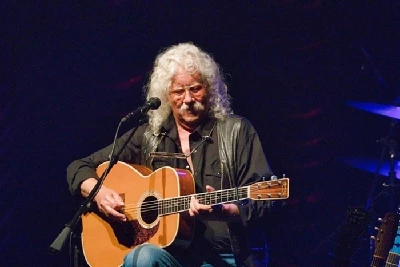Arlo Guthrie - Interview
by Lisa Torem
published: 31 / 7 / 2013

intro
Lisa Torem chats to folk and protest singer Arlo Guthrie about his lengthy career, his political work and the influence upon him of his father, Woody Guthrie
Thanksgiving may be a standard family celebration for most Americans, but for Arlo Guthrie the annual traditional feast became the buzzword for an eighteen-minute comic monologue and movie. Guthrie wrote 'Alice's Restaurant' about the day he and good friends, Ray and Alice, got together for the holiday dinner. Afterwards, Arlo and a pal loaded up a truck to dispense of the rubbish only to find that the dump was officially closed. With few other options, they left the rubbish in a heap. Once the local police got involved, a series of madcap activities, however, followed after Arlo was called into question for littering. He also discovered that being arrested for this misdemeanour meant he could avoid being drafted into the raging and unpopular Vietnam War. The song also inspired a film in 1969 by the same name, which was directed and written by Arthur Penn, and starred Arlo. Arlo became a cultural icon during Woodstock when he sang 'Coming into Los Angeles'. As the fifth child of troubadour Woody Guthrie, the prolific writer of hundreds of political songs, and who died of Huntington's disease when Arlo was in his early 20s, he grew up in a world where musical self-expression was highly valued, especially when it was directed towards illuminating social causes. To that end, the younger Guthrie, like his father, has performed and participated in hundreds of fund-raising events. Woody and Arlo too have sung about urban gateways, using original and imaginative string arrangements to underscore their themes. Arlo Guthrie's 'Washington County' has been considered one of his finest albums, but his discography is loaded with soulful spirituals, roots music, descriptive narratives and covers of other respected songwriters. The Guthrie musical tradition still continues as Arlo's entire family tours the nation and his offspring develop their own musical legacies. Arlo spoke to Pennyblackmusic readers setting off on the road once again for a grand American tour. PB: 'Washington County' was one of your most critically acclaimed albums, and even after being re-mastered still retained its down-to-earth quality. Most of the songs were originals, but you also covered timely tunes by Dylan and your father. What tracks made this album stand out in your mind and what memories do you have of working with Ry Cooder, Hoyt Axton and Doug Dillard? AG: Wow. Nobody has brought up that album in a while. It's hard to remember back to 1970 but a few things come to mind. I had just married the girl of my dreams, the Woodstock Festival was still being talked about as a recent event and I was writing lots of songs. Some have held their own over the years, others have not. Working with Ry was wonderful; he was (and remains) such a talented, gifted player. He just had unusually good musical sense. Meanwhile, I had met Hoyt and Doug through my wife, Jackie. They hung around The Troubadour (folk club Mecca in L.A. - Ed) in those days, where Jackie had been working when I met her. They became family friends as well as friends I loved using on records. PB: 1970 was a big year for singer-songwriters. Tim Buckley's 'Starsailor' and Neil Young's 'After the Goldrush' were also on the charts when 'Washington County' was released. Who were you listening to at that time and who do you enjoy listening to now? AG: I was listening to the same stuff as everyone else, but I have no idea what was on the charts back then. Our music was meant for a different audience than what was on radio. As the 60s ended and the 70s began, record companies were reclaiming authority over what kind of material was recorded -- unlike the high point of the 60s where artists controlled their own musical evolution. So, as far as I was concerned. money rather than creativity became the bottom line that the music industry used to gauge success. PB: 'I Could Be Singing' was a song on which you made political statements. "They're beating on you in Chicago/They're knocking you off in Ohio" - You referenced Spiro Agnew, the Kent State shootings and the 1968 Chicago Riots. Was the song ever banned or did you have free reign when performing it during its history? AG: I was able to perform it anywhere as far as I can remember. PB: Your approach to performing seems very natural. While some entertainers rely on a lot of technical staff, you seem very comfortable tuning up and spending time talking to your audience and other performers while onstage. AG: That wasn't an approach. That was all I could do. PB: Where did you learn your style of piano and guitar picking? AG: I always loved the barrelhouse style of piano so I've used it over and over to express my thoughts in songs. Guitar was different. I figured out how to mimic the things I loved about piano on the guitar, but I also was able to learn a great deal from the older guys who were still living at that time. So my available styles on guitar were far more vast than my abilities on the piano. Like young people today, I absorbed whatever I could from hearing recordings, or live performances. I listened to everything and stole whatever I could figure out. PB: Wilco, Billy Bragg and the Klezmatics made up their own musical arrangements to your father's text, which had been discovered in an attic. How did you feel about the music that resulted from the 'Mermaid Avenue' albums and do you think your dad would have approved of the concept and the arrangements? AG: The lyrics were in my father's archives where my younger sister, Nora had gathered it all together. She discovered lots of treasures including the lyrics you've mentioned. Her genius was in finding the right artists to work with the right lyrics and produce many albums over the past 20 years. I'm 100% sure my father would have loved the songs that resulted from his lyrics being set to the music from all these folks. PB: Many of Woody's songs were based on stories about hard working people, like Tom Joad in 'The Grapes of Wrath', and events that affected everyday people in a harsh way: dust storms and songs about deportees, or songs about bank robbers like Pretty Boy Floyd. How much of your own style was influenced by these profound narratives? AG: My dad repeatedly said to "write what you know." So, I've stuck to writing about what has affected my life. It's worked out pretty well - so far. PB: Do you know of any universities teaching courses about Woody Guthrie? If not, do you think his work should be part of the college curriculum? AG: I think I've heard about these kinds of things, and I value academic study. As I, however, wasn't very good at it myself, its value isn't as great to me as discovering what you already know without the governing bodies of institutional learning. It's one of the great lessons strewn throughout my father's work: He always said, "Let me be known as the man who told you something you already knew." A good academic education seems like a great idea for knowing how to express yourself to others in ways we all can understand - good grammar - stuff like that. But it's not so good at helping you discover the wisdom and knowledge that you're already born with. It seems to me everybody comes into this world with something they instinctively know, and something which needs to get done, both personally and for the betterment of everyone else. The sooner and the easier we made it to do that, the sooner we evolve as a civilization. PB: Last year, you and your family circled the country in honour of what would have been Woody Guthrie's 100th birthday. What were your favourite memories of that tour and what kind of audience reaction did you get? AG: People everywhere seemed to like the shows. I loved it because it was so much fun playing with all the kids and grandkids. Jackie filmed the entire tour, and we're so thankful that she got to be out there on the road with all of us in what would be her last road trip. PB: You've helped raise awareness and money for Farm Aid, Huntington's Disease and other charities through your performances. What causes have affected you most? AG: Establishing better conditions for personal and global community wisdom and knowledge isn't really a cause yet, but it will be as we figure out how to live in a world that gets smaller everyday. Some are moved to create a new world order, while others are guessing at who, if anyone, is giving the orders. There's enough technical knowledge to feed everyone, but not enough knowledge about what's good to eat. People with good intentions can do as much, if not more damage as people who don't give a damn. Only personal knowledge and wisdom can lead us back from the brink of authoritarian disaster or chaotic thinking. Everyone running to save themselves is not the best idea, nor is waiting for some miraculous appearance to save us from ourselves. The powers and abilities we will need will not be found in military superiority or in authoritarian government but rather in the unique qualities we have as human beings to use the wisdom and knowledge we are endowed with by our creator - In that sense we have the right tools already. Now we just need to figure out how to use them. PB; 'Alice's Restaurant' was one of your most famous songs. Is it a set piece or improvised? Do you still enjoy playing it? AG: I haven't performed it for just under a decade. I'll learn and perform it again for the 50th Anniversary sometime about 2015. PB: Do you feel the music industry has changed for the better or for the worse? AG: I don't know much about the music industry. PB: What current events would translate well into musical ideas? AG: For me, there's not much current events, which are not also repeating events. I keep trying to say the same things but it comes out differently. PB: For whom did you write 'If You Would Just Drop By'? AG: I wrote it for myself. PB: Thank you! AG: You're welcome!
Band Links:-
https://www.arloguthrie.com/https://www.facebook.com/arloguthrie/
https://twitter.com/folkslinger
Picture Gallery:-


live reviews |
|
Lobero Theatre, Santa Barbara, 19/3//2019 |

|
| L.Paul Mann watches iconic singer-songwriter Arlo Guthrie make a welcome return to the Lobero Theater in Santa Barbara. |
| Old Town School of Folk Music, Chicago, 13/10/2013 |
most viewed articles
current edition
Carl Ewens - David Bowie 1964 to 1982 On Track: Every Album, Every SongArmory Show - Interview with Richard Jobson
John McKay - Interview
Colin Blunstone - Thalia Hall, Chicago, 16/7/2025
Bathers - Photoscapes 1
Billie Eilish - O2 Arena, London, 10/7/2025
Loft - Interview
Visor Fest - Valencia, Spain, 26/9/2025...27/9/2025
Sir Tim Rice - Interview
Robert Forster - Interview
previous editions
Manic Street Preachers - (Gig of a Lifetime) Millennium Stadium, Cardiff, December 1999Heavenly - P.U.N.K. Girl EP
Beautiful South - Ten Songs That Made Me Love...
Peter Perrett - In Dreams Begin Responsibilities Interview Part One
Boomtown Rats - Ten Songs That Made Me Love....
Oasis - Oasis, Earl's Court, London, 1995
Coldplay - Wembley Arena. London, 16/8/2022
Prolapse - Interview
Trudie Myerscough-Harris - Interview
Pixies - Ten Songs That Made Me Love...
most viewed reviews
current edition
Davey Woodward - Mumbo in the JumboSick Man of Europe - The Sick Man of Europe
Lucy Spraggan - Other Sides of the Moon
Amy Macdonald - Is This What You've Been Waiting For?
Suzanne Vega - Flying With Angels
Blueboy - 2
Bush - I Beat Loneliness
Phew, Erika Kobayashi,, Dieter Moebius - Radium Girls
Alice Cooper - The Revenge of Alice Cooper
Cynthia Erivo - I Forgive You
Pennyblackmusic Regular Contributors
Adrian Janes
Amanda J. Window
Andrew Twambley
Anthony Dhanendran
Benjamin Howarth
Cila Warncke
Daniel Cressey
Darren Aston
Dastardly
Dave Goodwin
Denzil Watson
Dominic B. Simpson
Eoghan Lyng
Fiona Hutchings
Harry Sherriff
Helen Tipping
Jamie Rowland
John Clarkson
Julie Cruickshank
Kimberly Bright
Lisa Torem
Maarten Schiethart